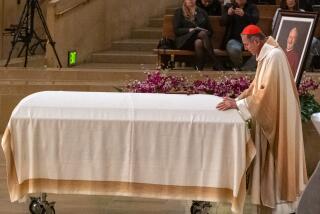Jury Deadlocks in Pastor’s Trial : Justice: For the third time, a jury has failed to agree in a sexual molestation trial of David Rickard of Sierra Madre.
- Share via
PASADENA — For the third time in less than two years, a trial on charges of sexual molestation against Sierra Madre youth pastor David Rickard has ended in a deadlocked jury.
Jury foreman Carl Maertens notified Pasadena Superior Court Judge Gilbert C. Alston on Tuesday that, after three days of deliberations, the jury was hopelessly deadlocked at 7 to 5 in favor of conviction.
Rickard, the 40-year-old founder of a Sierra Madre anti-drug program, was charged with 10 counts of oral copulation with a minor, a 15-year-old Glendale boy who was under his supervision. The youth, now 20, was the prime prosecution witness.
Alston set a hearing for Sept. 21 to discuss whether to retry Rickard or to dismiss the charges against him.
In another trial in Pasadena Superior Court last year on the same charges, a jury deadlocked at 11 to 1 in favor of conviction.
Before that, a jury in Shasta County, considering charges of 110 counts of oral copulation against Rickard, ended its deliberations in February, 1989, deadlocked at 9 to 3 in favor of conviction. The Glendale youth also was the key prosecution witness in that case.
Rickard is scheduled to be retried in Shasta County beginning Sept. 18.
The outcome of the latest Pasadena trial was further clouded by a note from at least three of the jurors, presented to Alston late Tuesday. On Wednesday, the judge confirmed reports that the signatories believed they had been “rushed” in their deliberations by another member of the jury, reportedly foreman Maertens.
Alston expressed puzzlement at the jurors’ criticism. “There was a colloquy (in court) that lasted about 15 minutes,” Alston said. “I asked them, ‘Is there anything I can do for you? Do you want to review any testimony? Are there any suggestions you might have to break the logjam?’ They all sat there.
“I can’t quite understand why the people who signed the note would sit there and not bring it up in open court,” Alston added.
Maertens, a Monrovia plumber, could not be reached for comment Wednesday.
But Robert Cohen, assistant head deputy of the Pasadena prosecutors’ office, said the note may be the basis for requesting a new trial. “We may just do him again,” Cohen said.
The charges against Rickard in Pasadena and Shasta County grew out of allegations by the Glendale youth, whose name has been withheld at the request of his family, that he had been enticed into a sexual relationship with Rickard for 2 1/2 years while he was in the older man’s care in Pasadena and in Northern California.
Rickard, a short man with shoulder-length blond hair, emerged from the courtroom Tuesday to say that his prosecution was a “witch hunt” initiated by “an angry foster child who had been rejected by his parents.”
Some of the jurors said there were inconsistencies from both sides in the case.
“It boiled down to the two testimonies--victim and defendant,” Maertens said. “There were inconsistencies on both sides. There was the matter of proving beyond a reasonable doubt. I don’t think the prosecution did.”
A juror who identified herself only as Judy said she found both sides unbelievable. “That’s what made it so difficult,” she said. “There was not enough evidence.”
But Euell Joe, a census interviewer from West Covina, said he felt Rickard was “manipulating and maneuvering” in his courtroom demeanor. “I felt the witness for the prosecution was more believable,” said Joe, who favored conviction.
Prosecutor Robert de Carteret said child molestation cases are hard to prosecute when the defendant appears to be an upstanding citizen. “You have a defendant who doesn’t fit your profile of what a criminal looks like,” he said. “It’s not somebody with greasy hair and a trench coat and tattoos.”
De Carteret acknowledged that Rickard had had a positive impact on many people, adding to the prosecution’s difficulties. “Compared to the typical criminal case, this one was a little bit harder,” he said.
Alston will make the final decision on whether the case is retried. He said that, though the jurors’ note could be a factor in motions brought by either side in the case, it did not require any action by the judge.
“Essentially the case is at a posture right now where the decision is mine on whether the case gets to be retried,” Alston said.
More to Read
Sign up for Essential California
The most important California stories and recommendations in your inbox every morning.
You may occasionally receive promotional content from the Los Angeles Times.













